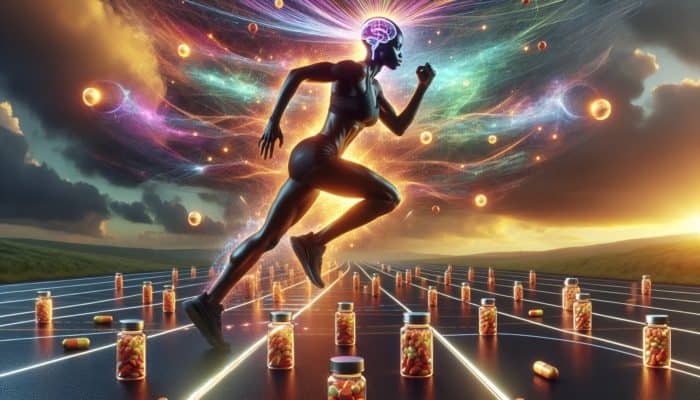Unlock the Potential of Nootropics to Enhance Cognitive Performance in Athletes
Understanding Nootropics: Their Role in Boosting Cognitive Function for Athletes

Nootropics represent an intriguing segment within the field of sports nutrition, characterised by substances meticulously crafted to elevate cognitive function. This unique category of compounds aims to provide athletes with a competitive edge by enhancing their mental faculties during both training and competitive scenarios. Encompassing a wide array of supplements, pharmaceuticals, and functional foods, these agents are designed to support brain health and promote significant cognitive enhancement. The allure of nootropics lies in their potential to improve mental acuity, thereby enabling athletes to maintain unwavering focus and clarity during high-stakes situations. Here are some of the most sought-after nootropics utilised by athletes:
- Caffeine
- L-Theanine
- Rhodiola Rosea
- Bacopa Monnieri
- Creatine
- Panax Ginseng
- Alpha-GPC
- Phosphatidylserine
These compounds are instrumental in amplifying various facets of cognitive function, including memory retention and adept decision-making, both of which are paramount in the high-pressure context of sports.
A Comprehensive Overview of the Different Types of Nootropics Available to Athletes
The realm of nootropics is extensive and diverse, encompassing both synthetic and natural alternatives. While synthetic compounds are often engineered for potent effects, natural extracts provide a gentler and more balanced approach to cognitive enhancement. The primary classifications of nootropics include:
- Synthetic Nootropics: Examples include Piracetam and Noopept, which are specifically developed to enhance cognitive capabilities.
- Naturally Occurring Nootropics: Such as Ginkgo Biloba and Panax Ginseng, sourced from various plant origins.
- Amino Acids: Essential compounds like L-Tyrosine and L-Theanine, crucial for the synthesis of neurotransmitters.
- Vitamins and Minerals: Vital micronutrients that are fundamental in supporting brain health and boosting cognitive performance.
- Herbal Nootropics: Such as Rhodiola Rosea, renowned for their adaptogenic properties.
Each category operates through distinct mechanisms to enhance cognitive capacities, offering a plethora of advantages for athletes striving for peak performance.
Exploring the Mechanisms by Which Nootropics Enhance Cognitive Functionality
Nootropics function by modulating essential neurotransmitter systems and activating neuroprotective mechanisms. They facilitate increased cerebral blood flow and enhance neuronal communication, culminating in improved cognitive abilities. The primary neurotransmitter systems targeted by nootropics include:
- Dopaminergic System: Linked to pleasure and reward, which enhances motivation and focus.
- Cholinergic System: Fundamental for memory, learning, and attention.
- Serotonergic System: Responsible for mood regulation and emotional stability, fostering resilience to stress.
- Glutamatergic System: Essential for synaptic plasticity and various cognitive processes.
- Norepinephrine System: Influential in attention, arousal, and responses to stress.
Through the modulation of these systems, nootropics significantly enhance cognitive performance, which is a crucial element for athletes aiming to achieve their utmost potential in their respective sports.
Unveiling the Transformative Benefits of Nootropics for Athletes

Enhancing Focus and Concentration: The Benefits of Nootropics for Athletes
A notable advantage of nootropics lies in their ability to amplify focus and concentration, both of which are essential skills for athletes during training and competitive events. By minimising distractions, nootropics empower athletes to immerse themselves completely in their performance, cultivating a state of flow that maximises their output. For instance, Caffeine is widely acknowledged for its capacity to enhance alertness while diminishing perceived exertion, enabling athletes to perform at elevated intensities.
Furthermore, nootropics such as L-Theanine, particularly when combined with Caffeine, can induce a state of relaxed alertness, offering a balanced cognitive boost devoid of undesirable side effects. This combination facilitates sustained focus over extended periods, particularly beneficial in endurance sports where mental stamina is often tested. The cognitive advantage derived from heightened concentration can often be the decisive factor between victory and defeat, empowering athletes to implement intricate strategies and swiftly adapt to shifting conditions.
The Impact of Nootropics on Memory and Learning Enhancement in Sports
For athletes, the ongoing acquisition of new techniques, strategies, and routines renders memory retention a critical facet of training. Nootropics that bolster memory can profoundly enhance an athlete’s capacity to absorb and recall information effectively. For example, Bacopa Monnieri is renowned for its memory-boosting properties and is frequently sought after by students and professionals alike for cognitive improvement.
In team sports, where tactical plays are in constant evolution, athletes can significantly benefit from nootropics that facilitate the rapid learning and retention of complex information. Moreover, these cognitive enhancers also assist athletes in developing muscle memory, making physical movements more instinctive and refined. Hence, the combined benefits of enhanced memory and learning can result in superior performance and strategic advantages in competitive scenarios.
Examining the Effects of Nootropics on Physical Performance Enhancement

While the primary focus of nootropics is on cognition, many also provide indirect benefits for physical performance. By enhancing mental stamina, alleviating fatigue, and boosting motivation, nootropics can lead to improved physical outcomes. For example, substances like Rhodiola Rosea have shown the ability to reduce perceived fatigue, allowing athletes to push beyond their limits during strenuous training sessions.
Additionally, creatine is recognised not only for its physical performance benefits but also for its cognitive enhancements during high-intensity workouts. The mental clarity it offers can aid athletes in achieving peak performance by elevating their focus and energy levels. Nootropics that positively influence physical performance include:
- Caffeine
- Creatine
- Rhodiola Rosea
- Panax Ginseng
- Beta-Alanine
- Tyrosine
By integrating these substances into their training regimen, athletes can effectively bridge the gap between mental sharpness and physical capability.
Enhancing Reaction Time and Decision-Making Skills with Nootropics
In the fast-paced arena of sports, swift decision-making and rapid reactions can dramatically alter outcomes. Nootropics play a crucial role in improving an athlete’s reaction time and decision-making capabilities. By enhancing neural communication and processing speed, nootropics such as Noopept and Alpha-GPC empower athletes to make quick, informed decisions essential for success in competitive environments.
Athletes engaged in sports demanding swift responses, such as basketball or soccer, can gain substantial advantages from the cognitive enhancements provided by nootropics. Improved reaction times enable athletes to respond more effectively to opponents and changing game dynamics. Moreover, the clarity and confidence facilitated by nootropics can reduce hesitation, allowing athletes to execute plays with precision. The cognitive benefits associated with improved decision-making can be pivotal, enabling athletes to seize critical opportunities that arise during competition.
Utilising Nootropics for Stress Reduction and Enhanced Mental Resilience
Athletes often face significant stress, whether arising from competitive pressures, training demands, or personal challenges. Nootropics can serve as effective tools for managing stress and enhancing mental resilience, thereby equipping athletes to perform optimally under pressure. Substances like Ashwagandha and L-Theanine are well-regarded for their ability to modulate stress responses, fostering a sense of calm and focus.
By alleviating the physiological impacts of stress, nootropics empower athletes to sustain composure and mental clarity during critical moments. This mental resilience is particularly vital in sports where performance anxiety could lead to subpar outcomes. Nootropics facilitate emotional regulation, allowing athletes to recover from setbacks and maintain a constructive mindset throughout their training and competitive experiences.
Insights from Experts on Nootropics and Sports Nutrition
Expert Recommendations for the Use of Nootropics in Athletic Training
Professionals in the field of sports nutrition are increasingly scrutinising nootropics, discussing both their potential benefits and associated risks. The consensus among experts is that, when employed correctly, nootropics can offer athletes significant cognitive advantages. Real-world applications are evident in professional sports, where athletes have reported enhanced focus and improved reaction times through tailored nootropic regimens.
For instance, elite athletes in disciplines such as football and tennis frequently utilise nootropics to better manage the cognitive demands of their games. Coaches have observed that athletes who incorporate nootropics exhibit improved comprehension of complex plays and maintain concentration throughout training sessions. This highlights the practical advantages of nootropics, demonstrating that they are not merely theoretical enhancements but valuable tools for genuine performance improvement.
Safe Integration of Nootropics into Athletic Training Routines
Prioritising safety is crucial when considering the incorporation of nootropics into sports practices. Athletes should consistently engage with healthcare professionals or sports nutritionists prior to adding nootropics to their routines. Personalised guidance ensures that athletes select substances that align with their individual needs and performance objectives. Awareness of potential side effects is essential, as individual responses to nootropics can vary significantly.
Gradually introducing nootropic compounds, commencing with lower doses, allows athletes to assess tolerance and effectiveness without risking adverse reactions. Additionally, sourcing nootropics from reputable suppliers is vital to ensure quality and safety. Responsible usage entails adhering to recommended dosages and avoiding combinations that could lead to overstimulation or dependency.
Ethical Considerations Surrounding Nootropic Use in Sports
The incorporation of nootropics into athletic practice raises significant ethical questions regarding fairness and competition. As cognitive enhancers become increasingly prevalent, discussions surrounding their usage intensify, particularly regarding accessibility and the potential creation of an uneven playing field. Athletes must thoughtfully consider the implications of nootropic use in relation to the spirit of competition, reflecting on how their usage may impact their integrity and the integrity of their sport.
Moreover, regulatory bodies across various sports are beginning to assess the classification of nootropics, determining whether they should be regarded as performance-enhancing substances or remain categorised as dietary supplements. Ethical considerations extend beyond the individual athlete, affecting team dynamics and the overall culture of sports. Athletes must navigate these complexities while pursuing cognitive enhancements and remaining aligned with their values and the principles of fair play.
Investigating Nootropics in the Battle Against Mental Fatigue
Combatting Mental Fatigue: The Role of Nootropics for Athletes
Mental fatigue can significantly impede an athlete’s performance, adversely affecting focus, decision-making, and overall energy levels. Nootropics combat mental fatigue by enhancing neurotransmitter activity and promoting neuroprotection. Compounds like Rhodiola Rosea and Panax Ginseng are especially effective in mitigating the effects of mental fatigue, allowing athletes to uphold cognitive function throughout extended training sessions or competitions.
The ability to maintain high energy levels and mental clarity is crucial for athletes participating in demanding sports. Nootropics can help stave off feelings of exhaustion and sustain motivation, enabling athletes to navigate challenges more efficiently. By targeting the underlying mechanisms of mental fatigue, nootropics empower athletes to train harder and perform better, ultimately yielding improved overall results.
Identifying the Most Effective Nootropics for Enhancing Mental Stamina
Certain nootropics are particularly noted for their capacity to enhance mental stamina, allowing athletes to sustain cognitive function during high-intensity activities. Substances like Caffeine and L-Theanine work synergistically to elevate alertness and concentration while minimising jitteriness. Additionally, the potent nootropic Bacopa Monnieri has demonstrated efficacy in supporting memory retention and cognitive endurance, making it a prime choice for athletes engaged in lengthy training sessions.
The leading nootropics for bolstering mental stamina encompass:
- Caffeine
- L-Theanine
- Bacopa Monnieri
- Rhodiola Rosea
- Panax Ginseng
- Tyrosine
These compounds enhance cognitive resilience, empowering athletes to remain sharp and focused even as physical demands escalate.
Utilising Nootropics as a Shield Against Burnout
Burnout is a significant concern for athletes, particularly those subjected to rigorous training schedules and intense competitive pressures. Nootropics can play an instrumental role in preventing burnout by enhancing cognitive function and emotional well-being. By boosting focus, alleviating anxiety, and strengthening stress management, nootropics support athletes in maintaining motivation during challenging periods.
Athletes who manage their cognitive workload effectively are less prone to mental exhaustion, which often precipitates burnout. By incorporating nootropics into a balanced training regimen, athletes can secure the support necessary to navigate demanding schedules while safeguarding their mental health. Ultimately, this approach can foster sustained performance and a healthier relationship with their sport.
Guidelines for Choosing the Right Nootropics to Manage Mental Fatigue
Selecting the appropriate nootropics to address mental fatigue necessitates a comprehensive evaluation of individual needs, performance objectives, and potential side effects. Athletes should begin by identifying their specific challenges related to focus, memory, and fatigue levels. Consulting healthcare professionals can provide invaluable insights into which substances may be most beneficial.
It is crucial to consider the synergistic effects of nootropic combinations, as certain substances may work more effectively in tandem with others. For example, pairing L-Theanine with Caffeine can enhance alertness while counteracting jitteriness. Furthermore, athletes should remain conscious of their overall health, ensuring that their nootropic choices align with their dietary and lifestyle preferences. By customising their approach to nootropics, athletes can effectively combat mental fatigue and optimise their cognitive performance.
Nootropics and Their Influence on Reaction Time Enhancement
Enhancing Reaction Time in Athletes Through Nootropic Use
Nootropics can significantly improve reaction time by enhancing neural communication and increasing processing speed. Many athletes rely on these cognitive enhancers to sharpen their responses to stimuli, which is crucial in sports necessitating quick reflexes and rapid decision-making. For instance, compounds like Noopept and Alpha-GPC stimulate neurotransmitter activity, enabling athletes to process information swiftly and react accurately.
The capacity to respond promptly to dynamic situations can be the determining factor between victory and defeat in competitive sports. By incorporating nootropics into their training regimens, athletes can develop sharper reflexes and enhance their overall performance. The cognitive advantages gained from nootropics translate into improved physical execution, providing athletes with a competitive edge.
Identifying the Best Nootropics for Promoting Quick Thinking
Nootropics that stimulate neurotransmitter activity and bolster cognitive processing are particularly beneficial for fostering quick thinking. Substances such as Caffeine, L-Tyrosine, and Rhodiola Rosea have proven effective in promoting alertness and mental agility. Athletes competing in fast-paced environments, such as basketball or soccer, can gain a competitive advantage by leveraging these cognitive enhancers to improve their reaction times and decision-making abilities.
The most effective nootropics for nurturing quick thinking include:
- Caffeine
- L-Tyrosine
- Rhodiola Rosea
- Alpha-GPC
- Noopept
- Piracetam
These nootropics support the cognitive processes essential for athletes who must think critically and respond swiftly under pressure.
Do Nootropics Enhance Reflexes in Athletes?
Enhanced reflexes are paramount in various sports, where split-second decisions can determine the outcome of a game. Nootropics contribute to improved reflexes by optimising neural efficiency and communication between brain regions. By amplifying cognitive functions, athletes can react more swiftly to visual and auditory stimuli, leading to superior performance in their respective sports.
Compounds such as Caffeine and Alpha-GPC can accelerate the speed of neural transmission, a critical factor for athletes who must dynamically respond to their environments. Consequently, the cognitive advantages offered by nootropics translate into tangible improvements in reflexes, granting athletes a competitive advantage during crucial moments in competition.
Understanding the Risks Associated with Nootropic Use for Improving Reaction Time
While nootropics hold the promise of enhancing reaction time, they also come with inherent risks. Potential side effects may include overstimulation, anxiety, and dependency, particularly if nootropics are misused or consumed in excessive quantities. Athletes must approach the use of nootropics with caution, taking into account individual reactions and tolerance levels.
Moreover, athletes should remain aware of the legal and ethical ramifications surrounding nootropic use in their respective sports. Consulting healthcare professionals is imperative for navigating the complexities of safely incorporating nootropics. Responsible usage, an understanding of potential interactions, and awareness of overall health effects are essential for athletes contemplating the use of nootropics to enhance reaction times.
Research-Based Insights on the Benefits of Nootropics in Athletic Performance
Summarising Current Research Findings on Nootropics
A multitude of studies has investigated the effects of nootropics on athletic performance, revealing a range of promising outcomes. Research indicates that specific nootropics can enhance focus, boost memory, and even indirectly improve physical performance. For example, studies have demonstrated that Caffeine can enhance endurance and mitigate fatigue during prolonged exercise, while L-Theanine may augment cognitive function in high-pressure situations.
Athletes seeking to harness the power of nootropics should begin by identifying research-backed compounds that align with their performance objectives. Actionable steps include:
- Reviewing current literature regarding the efficacy of nootropics pertinent to their specific sport.
- Experimenting with varying dosages to ascertain optimal levels for individual responses.
- Closely monitoring changes in performance and cognitive function.
- Integrating nootropics into a comprehensive nutrition and training strategy.
Engagement with scientific literature empowers athletes to make informed choices about their cognitive enhancement strategies.
Evaluating the Reliability of Research on Nootropics
The credibility of studies concerning nootropics can fluctuate considerably, highlighting the necessity for meticulous evaluation of research findings. Athletes should prioritise studies featuring robust methodologies, such as randomised controlled trials and peer-reviewed results, to substantiate their conclusions. Research involving diverse populations and accounting for variables like dosage and timing provides more reliable insights into the effects of nootropics.
Athletes must differentiate between well-conducted research and anecdotal evidence. Engaging with credible sources can assist athletes in effectively navigating the landscape of nootropics, ensuring their choices are grounded in scientific evidence rather than hype or marketing. A thorough appraisal of research quality can also guide athletes in selecting nootropics, promoting safer and more effective usage.
Exploring the Long-Term Effects of Nootropics on Athletes
The long-term consequences of nootropic use remain an area of ongoing inquiry, as most studies have primarily concentrated on short-term outcomes. Although some research suggests that nootropics may confer lasting cognitive benefits, potential risks associated with prolonged use should not be overlooked. Athletes contemplating long-term nootropic consumption must weigh the prospective cognitive advantages against the risks of dependency and adverse side effects.
Expert evaluations indicate that maintaining a balanced approach to nootropic use is crucial. Regular breaks from nootropic supplementation can help mitigate tolerance and reduce the likelihood of negative effects. Athletes should consistently assess their cognitive function and overall health, ensuring their nootropic strategies align with their long-term performance goals and well-being.
Utilising Nootropics for Effective Stress Management
Managing Stress: The Role of Nootropics for Athletes
Nootropics can profoundly assist in managing stress by modulating neurotransmitter systems responsible for mood and anxiety regulation. Substances such as Ashwagandha and L-Theanine are well-known for their calming effects, which can be particularly beneficial for athletes confronted with high-stress scenarios. By promoting relaxation and focus, nootropics empower athletes to perform optimally, even in challenging environments.
The physiological advantages of nootropics extend to enhanced stress resilience, enabling athletes to navigate the mental challenges posed by competitive sports more effectively. Additionally, certain nootropics may bolster emotional regulation, empowering athletes to maintain composure during high-stakes moments. This capability for effective stress management can lead to improved performance and a healthier psychological state.
Identifying the Most Effective Nootropics for Stress Relief
Choosing the appropriate nootropics for stress relief involves focusing on substances that encourage relaxation without impairing cognitive abilities. Nootropics such as L-Theanine, Ashwagandha, and Rhodiola Rosea have demonstrated significant effectiveness in reducing stress and anxiety levels. These compounds assist athletes in preserving mental clarity while alleviating the burdens associated with competition and training.
The leading nootropics for managing stress include:
- L-Theanine
- Ashwagandha
- Rhodiola Rosea
- Magnesium
- Chamomile
- Passionflower
Integrating these nootropics into a holistic recovery regimen can effectively support athletes in managing stress, fostering a positive mindset conducive to peak performance.
Enhancing Emotional Resilience in Athletes with Nootropics
Emotional resilience is a crucial attribute for athletes, enabling them to rebound from setbacks and sustain motivation. Nootropics that assist with emotional regulation can bolster this resilience, allowing athletes to navigate the challenges of competitive sports more effectively. Compounds such as L-Theanine foster calmness while enhancing cognitive clarity, facilitating a balanced emotional state.
By nurturing emotional resilience, nootropics empower athletes to confront adversity with confidence and determination. This enhanced capacity for emotional management can translate into improved performance under pressure, as athletes are less likely to succumb to anxiety or self-doubt. Incorporating nootropics into a comprehensive training and recovery strategy equips athletes with the emotional tools necessary for enduring success.
Nootropics and Enhancing Sleep Quality
The Impact of Nootropics on Sleep Quality for Athletes
Quality sleep is vital for athletes, as restorative rest is essential for both physical recovery and cognitive function. Certain nootropics can enhance sleep by promoting relaxation and reducing mental chatter, allowing athletes to attain deep, restful slumber. Compounds like Melatonin and L-Theanine are recognised for their sleep-enhancing properties, helping athletes optimise recovery during crucial rest periods.
The advantages of improved sleep extend beyond mere rest, as quality sleep directly influences cognitive performance, mood, and overall health. Nootropics that facilitate better sleep can be invaluable tools for athletes seeking a competitive edge in recovery and performance. Prioritising sleep through nootropic support is a critical consideration for athletes aiming to optimise their training and performance levels.
Identifying the Most Effective Nootropics for Sleep Quality Enhancement
The most effective nootropics for enhancing sleep quality are those that support the natural sleep cycle and promote relaxation. Compounds such as Melatonin, L-Theanine, and GABA (Gamma-Aminobutyric Acid) can assist athletes in achieving deeper, more restorative sleep. These substances help alleviate anxiety and create an optimal environment for quality sleep.
The leading nootropics for sleep enhancement include:
- Melatonin
- L-Theanine
- GABA
- Valerian Root
- Magnesium
- Chamomile
Incorporating these nootropics into a pre-sleep routine can enhance sleep hygiene, ultimately boosting athletes’ recovery and cognitive health.
Combating Jet Lag Symptoms with Nootropics for Travelling Athletes
Travelling athletes often encounter jet lag, which can disrupt their sleep patterns and adversely affect performance. Certain nootropics may assist in alleviating jet lag symptoms, helping athletes adjust to new time zones more effectively. Melatonin, in particular, is widely acknowledged for its capacity to regulate sleep cycles and mitigate the effects of jet lag.
By facilitating quicker adaptation to new schedules, nootropics can enhance athletes’ cognitive function and performance during competitions in different time zones. Incorporating nootropics into a travel routine can significantly aid athletes in optimising their recovery and ensuring peak performance when competition time arrives.
The Synergistic Relationship Between Nootropics and Nutrition
Optimising Performance: The Interaction of Nootropics and Nutritional Choices
An athlete’s dietary choices can greatly impact the efficacy of specific nutrients, potentially amplifying or inhibiting their cognitive effects. Diets rich in omega-3 fatty acids, antioxidants, and B vitamins can bolster overall brain health, potentially enhancing the advantages of nootropics. Conversely, diets high in sugar or heavily processed foods may detract from cognitive function and negate some benefits of nootropic supplementation.
Athletes should pursue a holistic approach that integrates nutrition with their nootropic regimen. By maintaining a balanced diet, athletes can maximise the cognitive benefits offered by nootropics, leading to improved performance outcomes. Harmonising dietary choices with nootropic use enables athletes to create an environment conducive to optimal cognitive function and athletic performance.
Foods That Complement Nootropic Use for Maximum Results
Integrating specific foods into an athlete’s diet can optimise the benefits of nootropics and enhance cognitive function. Foods rich in antioxidants, healthy fats, and essential vitamins and minerals play a significant role in promoting brain health. Nutrient-dense options such as leafy greens, fatty fish, nuts, and berries can amplify the effects of nootropics, forming a synergistic relationship that boosts cognitive performance.
Athletes should aim to include foods that complement their nootropic choices, such as:
- Fatty fish (rich in omega-3s)
- Nuts and seeds (high in antioxidants)
- Leafy greens (loaded with vitamins)
- Whole grains (providing sustained energy)
- Berries (packed with flavonoids)
- Dark chocolate (enhancing mood and cognition)
By prioritising a diet that promotes brain health, athletes can optimise the cognitive advantages conferred by their nootropic supplements.
Understanding the Role of Nootropics in Relation to Nutritional Supplements for Athletes
While nootropics can enhance cognitive function, they should not replace essential nutritional supplements that support overall health and athletic performance. Nutritional supplements, including protein powders, vitamins, and minerals, play a crucial role in maintaining physical health, aiding recovery, and boosting energy levels. Nootropics are cognitive enhancers, not substitutes for fundamental nutritional requirements.
Athletes must adopt a comprehensive approach to nutrition that encompasses both nootropics and necessary dietary supplements. Each element contributes uniquely to performance support, and neglecting nutrition in favour of cognitive enhancement can lead to imbalances and decreased performance. A well-rounded regimen that integrates nootropics with traditional nutritional supplements enables athletes to excel both physically and mentally.
The Importance of Meal Timing in Maximising Nootropic Effectiveness
The timing of meals can significantly influence the absorption and efficacy of nootropics. Consuming nootropics on an empty stomach may enhance their absorption, while pairing them with certain foods can either amplify or diminish their effects. For example, fats can facilitate the absorption of fat-soluble nootropics, whereas high-fibre foods may slow absorption rates.
Athletes should consider their meal schedules when incorporating nootropics into their routines. Proper timing not only maximises the efficacy of nootropic supplementation but also aligns cognitive performance with training and competition schedules. Understanding individual responses to meal timing can assist athletes in optimising their cognitive enhancement strategies for peak performance.
Addressing Common Questions Regarding Nootropics
What Are Nootropics and Their Primary Purpose?
Nootropics are substances designed to enhance cognitive function, encompassing various supplements, drugs, and functional foods aimed at improving mental performance.
How Do Nootropics Enhance Cognitive Function in Athletes?
Nootropics interact with neurotransmitter systems, increase cerebral blood flow, and protect neurons, resulting in improved cognitive abilities.
Can Nootropics Positively Influence Physical Performance?
Absolutely, certain nootropics can indirectly enhance physical performance by boosting mental stamina, reducing fatigue, and improving focus.
Are Nootropics Safe for Use by Athletes?
Safety varies based on individual reactions and proper usage; athletes should always consult healthcare professionals prior to using nootropics.
What Are the Most Effective Nootropics for Stress Relief?
Effective nootropics for stress relief include L-Theanine, Ashwagandha, and Rhodiola Rosea, which are known for their calming effects.
Can Nootropics Help Athletes Avoid Burnout?
Nootropics may assist in preventing burnout by enhancing cognitive function and emotional resilience, thus reducing the risk of mental fatigue.
What Are the Risks Associated with Nootropic Use?
Potential risks include overstimulation, anxiety, and dependency, particularly with misuse or excessive dosages.
How Can Athletes Choose the Right Nootropics for Their Needs?
Athletes should evaluate their specific needs, consult professionals, and consider potential side effects when selecting nootropics.
Do Nootropics Replace the Need for Nutritional Supplements?
No, nootropics should complement, not substitute, essential nutritional supplements necessary for overall health and performance.
How Do Meal Timings Affect Nootropic Effectiveness?
Meal timing can influence the absorption and effectiveness of nootropics; consuming them with certain foods can either enhance or diminish their effects.
Connect with Us on Facebook!
The Article Nootropics in Sports Nutrition: Enhancing Athletic Performance appeared first on https://athleticsupplement.com
The Article Nootropics Boosting Athletic Performance in Sports Nutrition Was Found On https://limitsofstrategy.com

